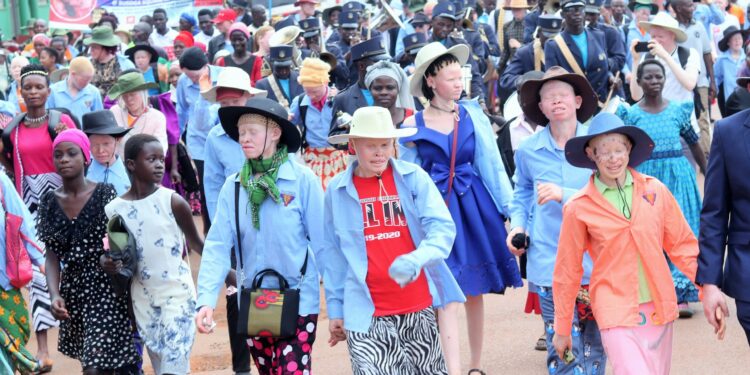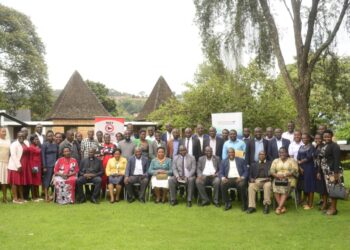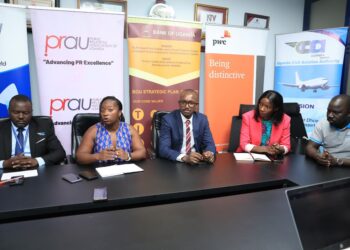JINJA
PERSONS with albinism in Uganda join the rest of the global community to mark the 10th International Albinism Awareness Day (IAAD) under the theme 10 Years of IAAD: A Decade of Collective Progress in a ceremony to be held at Busoga Square in Jinja City on 13 June, 2024.
According to the organizers, the guest of honor is expected to be Uganda’s Prime Minister Rt. Hon Robinah Nabanja who will most likely delegate an official from her office to preside over this annual event in recognition of the group.
Under their umbrella organization Source of the Nile Union of Persons With Albinism (SINUPA), people with albinism have since received tremendous progress as far as public awareness is concerned.
Activities of the day include a march parade led by a brass band and guided by the police in the streets, free medical testing, screening and counseling on various conditions as well as distribution of protective kits to people with albinism, among others at the venue.
There will also be entertainment by different groups to punctuate speeches by leaders and partners like NGOs and politicians who are expected to turn up in large numbers to mark the day.
The SINUPA Executive Director(ED) Peter Ogik says the misconceptions and myths once widely carried out by members of the general public about albinism have been reduced because of increased awareness over the years.
“…we can now freely interact with members of the public in public places like worship centres,markets,restaurants and shopping malls or in buses and taxis without anyone frowning as was the case…”,Ogik observed.
People With Albinism(PWA) have for years been subjected to all sorts of discrimination,banishment,cutting of body parts, violence and amputation of limbs for ritual rites, torture and murder due to myths and superstition and unfounded traditional beliefs.
“…some people think we are cursed by God, others say our body parts like hair can cure diseases or trigger wealth, while others look at us as very good items for sacrifices to dispel misfortunes…’,Peter Ogik lamented.
He said things have changed and attributed the improvement on deliberate government interventions coupled with efforts from NGOs and the media who intensified awareness campaigns to show that people with albinism have the same potential like any other persons.
Ogik who is 34 years this September commended the government of Uganda for waiving taxes levied on albino skin oil cream, lotion and other sun protection items.
Above all, Peter Ogik is happy that after years of lobbying the central government came out with the Uganda National Action Plan on Persons With Albinism which was officially launched in 2022.
The National Action Plan, a policy document for the promotion of persons with albinism which runs for five years aims to promote and protect human rights for the estimated more than 20,000 persons living with albinism in Uganda.
This after the government recognized albinism as a disability in 2020 which was described as a big milestone for the albinism in the country where for years faced discrimination.
What Government Should Do:
Peter Ogik appeals to the government through the Ministry of Health to recruit and train more dermatologists to be able to help people with albinism who report to health facilities in the country.
“…quite a number of health workers still have no idea on how to treat people with albinism to the extent that some of them always refuse to immunize their children or even touch adults…”he noted.
According to experts, a dermatologist is a medical doctor who specializes in conditions that affect the skin, hair and nails.
He also wants the government to procure cryoguns, an indispensable, portable and affordable tool used in treating and removing unwanted tissue especially on the skin of patients with albinism.
While success stories have been released, Peter Ogik notes that quite a lot more should be done including implementation of the Uganda National Action Plan on Persons With Albinism which has remained in the dusty shelves.
What You Need To Know:
Albinism is a rare non-contagious, genetically inherited condition which results in the lack of melanin pigment in the hair, skin and eyes causing vulnerability to sun exposure.
13 June marks the International Albinism Awareness Day, a day to reflect on the plight of people with albinism in many parts of the world, especially in Sub-Saharan Africa which has the highest prevalence in the world.
The UN General Assembly on 18 December, 2014 adopted a resolution establishing this day to bring visibility to the generic condition of albinism as well as people with albinism, their success stories and the challenges they continue to face on a daily basis in many countries.
About SNUPA
The Source of the Nile Union of Persons With Albinism (SNUPA) is headquartered at Igar Plaza, Main Street in Jinja City was founded in October 2012 as a body to protect and promote the rights of people with albinism through awareness campaigns.
SNUPA is led by Peter Ogik, described as an inspirational and dynamic youth who has travelled far and wide addressing international fora, including the UN General Assembly.
He works closely with Fazira Kawuma, a vision impaired female advocate and politician currently serving as the Deputy Mayor of Jinja City.
Passionate about supporting the vulnerable and excluded people, Fazira Kawuma is also the vice chairperson of National Council for Disability where she continues to encourage and help the unfortunate members on attitudinal change about their conditions.
Do you have a story in your community or an opinion to share with us: Email us at editorial@watchdoguganda.com













